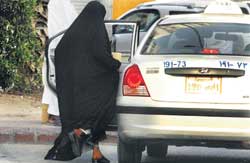
Going round in circlesJiddah, Saudi Arabia - For the first time ever, a group of women in the only country that bans female drivers have formed a committee to lobby for the right to get behind the wheel, and they plan to petition King Abdullah in the next few days for the privilege. The government is unlikely to respond because the issue remains so highly sensitive and divisive. But committee members say their petition will at least highlight what many Saudis - both men and women - consider a "stolen" right. "We would like to remind officials that this is, as many have said, a social and not a religious or political issue," said Fowziyyah al-Oyouni, a founding member of the Committee of Demanders of Women's Right to Drive Cars. "And since it's a social issue, we have the right to lobby for it." Committee members want to deliver their petition to the king by Sunday, Saudi Arabia's national day.
The driving ban applies to all women, Saudi and foreign, and forces families to hire live-in drivers. Women whose families cannot afford $300-$400 a month for a driver must rely on male relatives to drive them to work, school, shopping or the doctor's. The last time the issue was raised was two years ago, when Mohammed al-Zulfa, a member of the unelected Consultative Council, asked his colleagues to think about studying the possibility of allowing women over age 35 or 40 to drive - unchaperoned on city streets but accompanied by a male guardian on highways. The suggestion touched off a fierce controversy that included calls for al-Zulfa's removal from the council and stripping him of Saudi citizenship, as well as accusations he was encouraging women to commit the double sins of discarding their veils and mixing with men. The uproar underscored the divisions in Saudi society between the guardians of its super-strict Islamic codes of behavior and those who want to usher in more liberal attitudes. Conservatives, who believe women should be shielded from male strangers, say women in the driver's seat will be free to leave home alone and go when and where they please. They also will unduly expose their eyes while driving and interact with male strangers, such as traffic police and mechanics. But supporters of female drivers say the prohibition exists neither in law nor Islam, but is based on fatwas, or edicts, by senior clerics who say women at the wheel create situations for sinful temptation. Women tried to defy the ban once and paid heavily for it. In November 1990, when U.S. troops were in Saudi Arabia following Iraq's invasion of Kuwait, some 50 women got behind the wheel and drove family cars. They were jailed for one day, their passports were confiscated and they lost their jobs. Although the furor over al-Zulfa's comments has abated, anything that touches on the issue provokes strong feelings. In the weeks ushering in the holy Muslim fasting month of Ramadan, which began Thursday, a furious debate erupted in a Saudi newspaper over a Ramadan television serial that takes up the hardships the ban has caused. In the serial, "Amsha bint Ammash," the main character, Amsha, loses her father and is forced to relocate from her village to Jiddah. After an unsuccessful round of job searching, she decides to become a taxi driver - a job open only to men. To get around the ban, she disguises herself as a man, adding a mustache and donning the white robe and red-and-white-checkered headdress Saudi men wear. When the program was first advertised, some reacted with shock that a Saudi woman was not only portraying a man, but also one who drives. Conservatives say women should not emulate men in behavior or dress. The controversy has forced the serial's writer, Abdullah Abdul-Amer, to issue a statement stressing the goal of the program, aired on the Lebanese satellite channel LBC, "is not to incite women to drive." "All I wanted to do was raise our contemporary issues from a Saudi viewpoint and through comedy," said Abdul-Amer.
But that has not appeased Saudis determined to uphold the driving ban.
In a letter to Al-Hayat daily titled "Amsha, we don't need you," reader Iman Abdul-Wahhab wondered why the driving issue "has become an obsession for many, Saudis and non-Saudis."
"Has this become a weak point for us?" she wrote. "As a Saudi girl, I say, 'No.'"
"This is a tradition that has become acceptable," she added. "No one has any right to use it as a means to mock or ridicule." |
|| Front
Page | News | Editorial | Columns | Sports | Plus | Financial
Times | International | Mirror | TV
Times | Funday
Times || |
| |
Reproduction of articles permitted when used without any alterations to contents and the source. |
© Copyright
2007 Wijeya
Newspapers Ltd.Colombo. Sri Lanka. All Rights Reserved. |
